How female surgeons are cutting through prejudice and rising to the top in medicine
They’ve been mistaken for nurses or had patients demand a male doctor, but these female surgeons didn’t let that stop them rising to the top of a male-dominated profession.
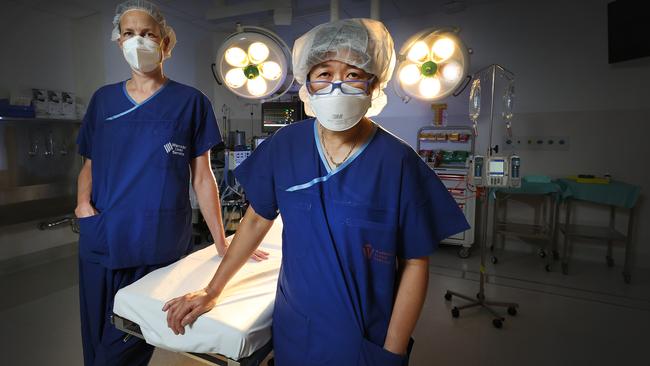
VWeekend
Don't miss out on the headlines from VWeekend. Followed categories will be added to My News.
They have been mistaken as nurses, and had patients refuse operations upon learning their surgeon was a female. Both their physical strength and emotional resilience for the job has also been questioned at times.
But three of Victoria’s leading surgeons have risen through the ranks to become – without an explicit goal to be – champions and visible role models for the next generation of women wanting to take up the scalpel, sutures or bony saw.
In an Australian-first, the three top surgical jobs at a major hospital are all held by women.
The Alfred Hospital’s director of surgery is Professor Wendy Brown, an upper gastrointestinal surgeon who was also the first woman appointed chair of the Monash University Department of Surgery in 2015.
Professor Silvana Marasco is director of cardiothoracic surgery and operates three days a week performing heart and lung transplants, implanting artificial hearts or managing chest trauma. Spine surgeon Associate Professor Sue Liew is director of orthopaedic surgery. As one of the three per cent of Australian orthopaedic surgeons who are female, she tends to everything from quadriplegics and paraplegics, though to spinal deformities and infections.
They say they are simply fuelled by their pure passion for the job and the privilege they feel every day at being able to walk with patients at their most vulnerable.
While the theme of this year’s International Women’s Day is breaking the bias, a campaign aimed at celebrating difference and levelling the playing field, The Alfred surgeons say they been largely blessed to have been championed in their careers by senior male surgeons.
There have been, however, challenges and stereotypes to break down. They say they are also aware not every female has had such a smooth ride.
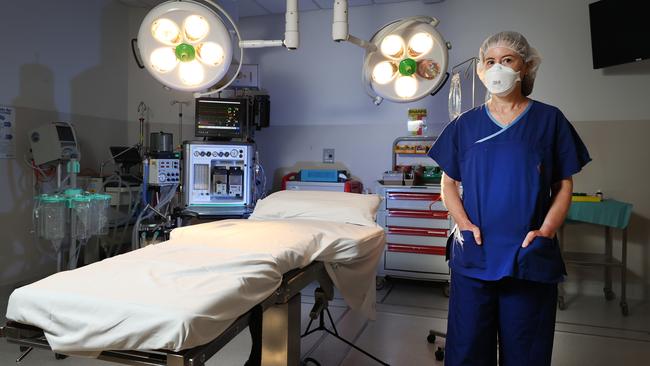
As a child, Associate Prof Liew was fascinated with how things worked.
“I don’t know how many clocks didn’t survive in my house because I’d pull them apart,” she said.
After originally trying engineering, she swapped to medicine. It was a choice driven largely by a determination to finish a university course rather than an initial spark for the profession.
“It’s not a course you do because you think about doing it, but you do medicine because you get the marks”.
While she didn’t enjoy the first few years, it was the clinical side of the course she was exposed to in the last part of her study that saw her passion ignited.
But soon she faced her first challenge as she progressed into the “brute force” arena of orthopaedic surgery.
“That was asked in my selection interview: ‘How can a petite little thing like you cope in the hurly burly world of orthopaedic surgery’?” she said.
“I used to say: ‘I’d direct people to do it for me. There is no reason why I need to be strong at all. If anyone asks me now I just say, you’ve got to work smart’.”
Associate Prof Liew, 59, has taken great delight in her ‘smarter not harder’ approach, developing a reputation for popping back in the impossible dislocated hip or shoulder with clever manoeuvring, instead of brute force or the need for anaesthetic.
“Sometimes you just have to think outside the box, or not be constrained by narrow western thinking,” she said.
“I think anybody can do anything. You just have to think about it. We have to stop seeing men and women. We’re all people who can do stuff.
“I remember at school seeing a sign saying any boys interested in learning projection report here at 1pm. And I turned up. Nobody said anything. They took me on and did it. You just can’t be put off by those things.
“It’s probably like the Nike ad. Just do it.”
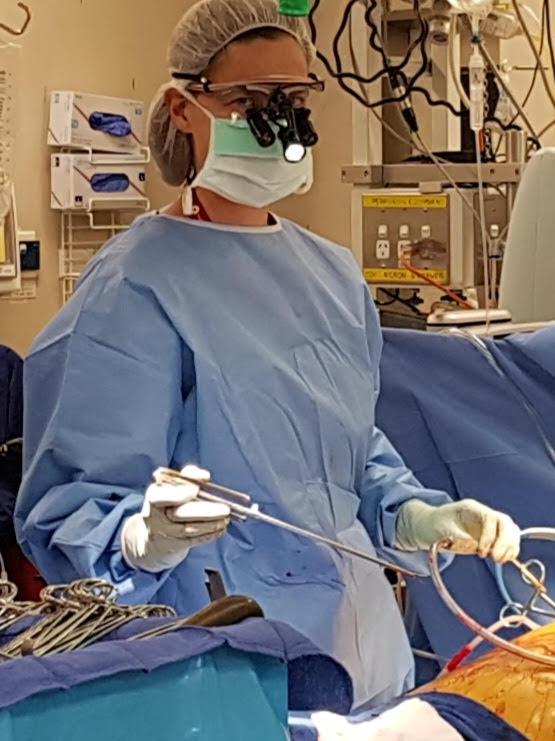
Professor Marasco, too, had her strength questioned. She got her first taste of medicine when a family friend, a plastic surgeon, slipped her into The Alfred on work experience under the guise that she was a medical student.
She got to scrub in, to watch surgery up close and live.
But it was a Fred Hollows documentary that made her fall in love with the pursuit of finding satisfaction in helping someone.
“When I started the cardiothoracic round in my hospital training, I just loved it,” she said.
“I loved the intricacy of the surgery, I love the patient population. They’re older patients, incredibly grateful that they get through. It’s such high stakes surgery and so rewarding.”
As it came time to pick a specialty, she approached the head of the unit to explain that she had found her calling with the heart and lungs.
“He said: ‘You can’t possibly do cardiothoracics, you’re a girl.’ He must have seen the shocked look on my face and he quickly back pedalled.
“He said: ‘You wouldn’t be strong enough to pull out the wires on a redo.’ Every time I do a redo now I think of him, and I tell that anecdote to my assistant.”
Not only did a patient refuse surgery after finding out she would be his surgeon – a stern telling off by his wife saw the patient sheepishly change his mind a few minutes later – but she has also been mistaken as clerical support.
“I’ve been mistaken as a nurse many times, and part of it is my foreign name I think. I’ve rung intensive care as a junior consultant.
‘Hello, it’s Silvana Marasco, I’m just checking on my patient Mr Smith’. ‘Oh, are you the interpreter?’
“I've dealt with that by just having tunnel vision in getting where I wanted to get, and making my CV as good as I could get it.”
Prof Marasco and Prof Brown joined the surgical training program together in 1996.
That year 20 per cent of The Alfred’s general surgical trainees were women.
At that time around the country, the proportion of women was just three to five per cent.
But even today women make up just 13 per cent of surgeons in Australia, making it the medical speciality with the lowest proportion of females.
The demanding hours, concerns about its incompatibilities with family life, the masculine culture and lack of female role models are the typical reasons medical students say in annual surveys that surgery may not be for them.
There are stereotypical traits in the workplace that can separate the sexes. Men are often celebrated as strong, assertive and bold. Women, on the other hand, are supposed to be more polite, co-operative and nurturing.
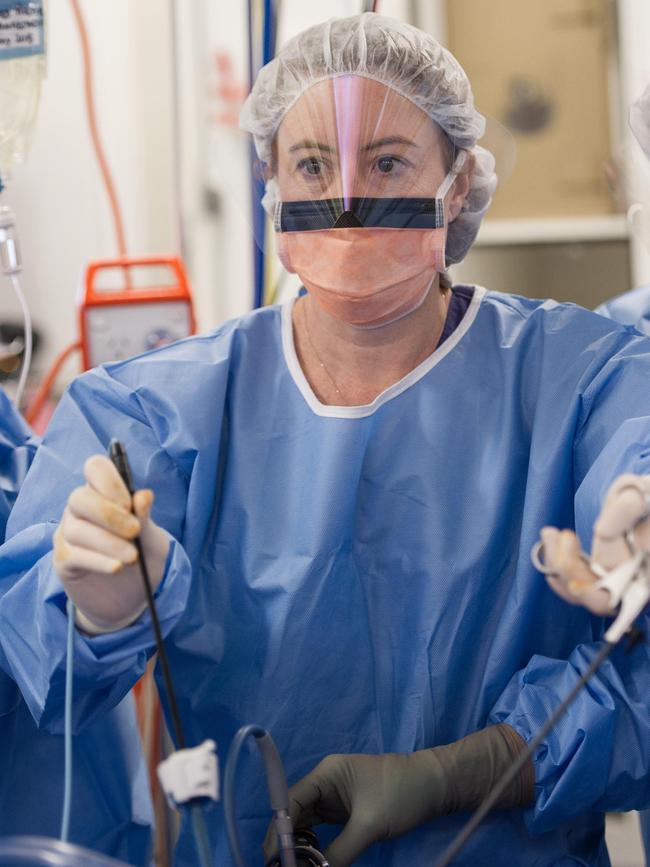
And while men are rarely told to reign in their masculine-driven behaviour, Prof Brown was confronted by this early in her career. But she has learned to turn it into her strength.
As the first generation in her family to attend university, Prof Brown topped her year in her final exam, which prompted the senior male surgeons to suggest she consider the specialty.
“I got a lot of support but one surgeon said to me, ‘I think you’re too emotional. You’re going to spend your whole time crying’. My dad said the same thing to me, too. He said, ‘You feel things too much, are you sure you want to do this? What are you going to do if you can’t save a patient?’ ”
And that time came. On one of her first on-call shifts as a first year registrar a young man, overcome by a flesh-eating bacteria, died.
“We couldn’t get ahead of the infection. His wife was heavily pregnant. It was a very emotional conversation with the family and I couldn’t help but cry,” she said.
“I had another trauma and again it was someone we couldn’t save; a young man. His family was upset and I was upset. I was struggling a bit.
“I went and saw a psychologist. I thought, ‘I’m lying awake in bed at night about this’. We weren’t offered counselling or debriefs back in the early 2000s.
“She said to me, ‘Do you really think this emotion is a weakness?’
“I got a letter from one of the families, and in it she said how much it had meant to her that the doctor cared enough to cry.
“It just made me think that maybe being part of someone’s journey is feeling some of the emotion with them and understanding what it means for them.
“It is a fine line because you can’t spend your life crying over everyone. You do need to be able to make rational decisions.
“But being open enough to understand what this person and their family have gone through as a massive life event for them, and never losing your humanity, allows me to be a better doctor.
“If I tried to shut that part off because of who I am, I think I wouldn’t be being true to myself or true to my patients.
“Part of becoming a good doctor is understanding who you are.”
Many workplaces across the board are becoming more family friendly, largely with the rise of flexible work shifts and locations.
But the reality remains that the burden of child rearing is still typically carried by women. These surgeons – two of whom are mothers – say they are cognisant of the extra support women might need while juggling time off to start a family, or once back at work just a few months after birth. But they say there is increasing demand to make the profession more family friendly to both men and women, driven by a new generation of fathers who want to be more hands on at home.
Prof Marasco, whose children are now aged 11 and 13, remembers well the sickening sleep deprivation in the early months and years.
She returned from maternity leave the first time after three months off; still breastfeeding through the night, while still fielding after hours calls that always seemed to come just as she had fallen asleep.
“You’re always juggling the time you spend with your children and the time you’re being called in for operating. Your time is so precious and you’re constantly being torn between the different competing elements in your life,” she said.
“My kids are a little older now, but even now they’ll still say; ‘Mum, could you please come home on time today? Can you please pick me up from school?’
“There are, without a doubt, aspects of their growing up that you’re going to miss because you’re at work operating.”
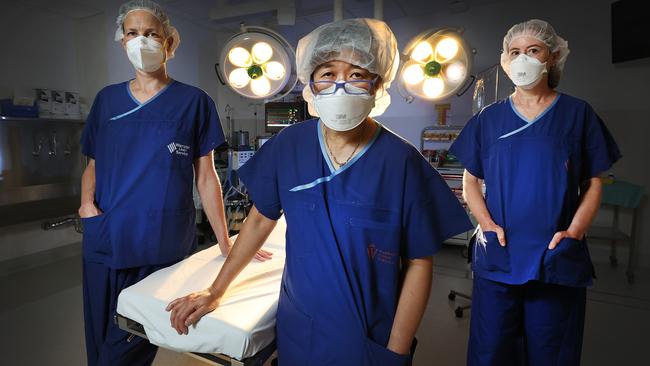
Three days a week Prof Marasco is in her scrubs, with consultations, meetings, administration tasks and research filling up the other two days,
“My husband and I often make this joke; he often says to me, ‘I wish I had a stay at home wife to do jobs’. I say to him, ‘Yes, I wish I had a stay at home wife, too!’
“I like to think that I’m extra cognisant of the extra support my female trainees will need, such as giving them the time they need at home, allowing them to go home early if they need to get away, understanding they’re going to be late.
“That’s the same with the males. I like to think I'm equally supportive of males and females, “Males are so much more involved in child rearing than they were a generation ago. I couldn’t do my job without my husband taking on a fair amount of the housework and cooking and picking up children from school.
“There really weren’t any female role models for me as I came through. There were no female surgeons ahead of me when I was training. That didn’t bother me. I just took the male surgeons as my role models.
“But I do hope I am a role model for female surgical trainees wanting to come through.”
Associate Prof Liew, whose youngest of four children is 18, said she still remembers feeling guilty for the six weeks maternity leave she took the first time, leaving her orthopaedic colleague on call for that entire time.
“It’s hard and you do need a lot of help. I had my mother and father move in,” she said.
“You just have to accept that, and you have to accept the thing it does to your head. When you’re at work you want to be at home. When you’re at home you want to be at work. “You’ve always got this feeling you’re never doing anything right. Therefore it’s important to have multiple mentors; one for each little bit of your life.”
Prof Brown said while the profession had come a long way since junior doctors like her worked 180 hour fortnights, more could be done to support a better work-life balance for all staff.
“I hear stories of other women who haven’t had the same experience as me and who haven’t been given that support,” she said.
“A part of me feels very guilty, and another part of me feels really outraged for them. The biggest part of me feels determined that I want to make sure now that I’m in a position (as director), that I will encourage and do my best – no matter who they are or where they come from – to at least make them think about surgery if they’re talented.
“I don’t think we get it completely right. There are a few things that are difficult in surgery, and I think we need to own that and look for solutions.
“One of the things is once you’ve operated on someone, you’re responsible for them. You can try sharing care and handing over care, and we do that. But from the patient’s point of view, having someone walk with them is the best experience.
“I think we do need get better for young people who want to interrupt training to have families – and it’s not just women.
“This generation the men want to be just as actively involved in parenting. We do need to get better to make it easier to be a parent and a surgeon.
“We as a profession can work to minimise the impact on the outside life, and encouraging people to have more of a life outside work because I think that is really healthy.
“I know surgeons get a bad rap … but we should celebrate what we do, too.
“Our jobs are important but we’re so lucky to have them. We’re privileged people trust their lives in our hands at a really vulnerable time in their life. I never want to forget what a privilege that is to be part of that journey.
“Anything I can do to encourage anyone who thinks it might be for them, I’d love to do.”



